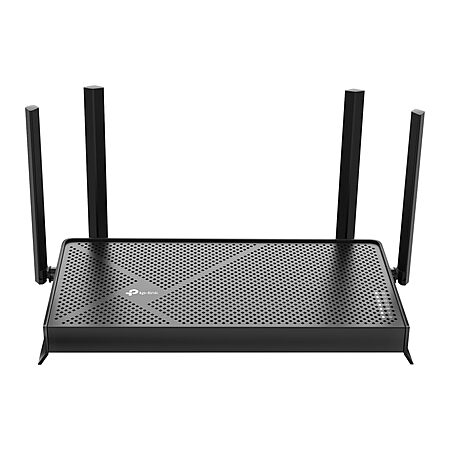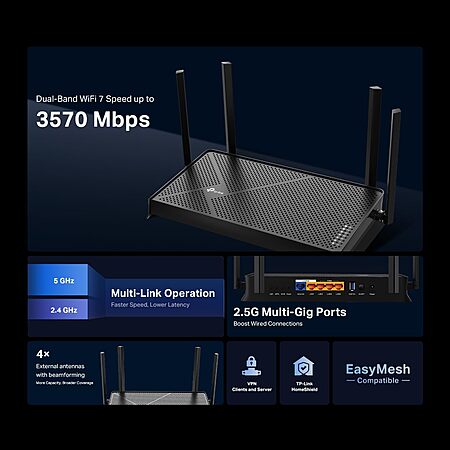Front page deal is back and better than ever from last month almost $20 cheaper after prime card. This ends the drought of no good router deals the last two-three weeks.
https://www.amazon.com/TP-Link-Du...09&sr=8-18
This has all the bells and whistles your average household will need and also have some for the techie with the 2 X2.5G ports which allows for an enhanced wired network.
This is a way better deal than the Wifi 7 Asus RT-BE58U that was FP for $126, because the TP-Link has 4 streams compared to the Asus 2 streams which means better performance, not to mention port selection is better. Overall this is a fire deal even if you dont have a prime card at the normal $83.74 which is the lowest yet for this router.
Router overall is well reviewed and has good feedback scores on multiple websites.
https://dongknows.com/tp-link-arc...er-review/
Lower level model reviewed by Rtings, so this builds and improves on it
https://www.rtings.com/router/rev...cher-be230
Honestly at this price, even using these guys as access points is a steal with the 2.5gbps port, if you dont trust China to do your routing, which is comical to me.


Leave a Comment
24 Comments
Sign up for a Slickdeals account to remove this ad.
This means that if your current router is a 3x3 or 4x4 ax model this one might be slower for your non BE clients especially at longer ranges.
This means that if your current router is a 3x3 or 4x4 ax model this one might be slower for your non BE clients especially at longer ranges.
People who are thumbing this down as not a good product, please find me a wifi 7 device for cheaper than $62 with these specs, I will wait.... Especially one that is well reviewed like this...
The biggest issue is range and coverage. This is the B230 from the rtings review you linked. They give it a middling score for range. That combined with the poor throughput means that this router could choke with a half dozen client devices in a medium sized house.
The 2.5Gbe ports are nice to have, but the wifi performance on this isn't even good enough for a 1Gb symmetric plan.
From a quick google, it seems like this will never support openwrt due to chipset incompatibility.
I just don't see the appeal over an isp provided router.
Our community has rated this post as helpful. If you agree, why not thank PeteyTheStriker
The biggest issue is range and coverage. This is the B230 from the rtings review you linked. They give it a middling score for range. That combined with the poor throughput means that this router could choke with a half dozen client devices in a medium sized house.
The 2.5Gbe ports are nice to have, but the wifi performance on this isn't even good enough for a 1Gb symmetric plan.
From a quick google, it seems like this will never support openwrt due to chipset incompatibility.
I just don't see the appeal over an isp provided router.
"Note: We've removed the Wi-Fi coverage tests, as we're exploring better ways to convey the results that'll be more helpful to users."
So for a more accurate coverage review you would need the dong knows review as he has a standardized setup.
"In terms of range, the Archer BE3600 was comparable to that of the Archer BE550. So, if you have a home of around 1,600 ft2 (≈140 m2) or slightly larger, it will likely deliver good signals to every corner when placed at the center."
Now for throughput/device count/speed. At point blank it delivered almost a full gig (950Mbps) most people looking for a entry level budget router will not be having 1 gig internet as its not even common or anywhere near the average in the United States.... Which means this router is already better than anything Asus has at entry to mid level wifi 6 and way better than its entry level wifi 7 devices. The chipset in this router without a doubt can handle half a dozen devices without a problem, it can easily handle around 20+ without breaking a sweat, so where you pulled that number from is puzzling.
In short this is entry level, yes it will work fine for 1Gbps internet, but as pointed out by the reviews the average for most people at average distances was around 700Mbps which is still a great pick up cause of DFS and MLO for an entry level router, same stuff in other routers would cost you more than double. Why people would want this, they want to avoid the $15 monthly rental fee from the ISP. Pays itself off in just over 4 months. Most average users dont care or even play with firmware.
Dong says it best:
Here's the bottom line: You won't get everything Wi-Fi 7 has to offer with the Archer BE230/BE3600. But if all you care about is Gigabit-class bandwidth for a single-broadcaster home, this little router has more than enough to offer. Get one today!
Clearly your looking for a router in the mid-highend range with your requirements. So expect that $180-300 price tag that comes a long with it, compared to this $60 price tag.
1. Wireless Coverage and Capacity:
I have two wireless security cameras installed around the house that occasionally drop connection to my current Verizon router, likely due to signal loss through multiple drywall layers. My plan is to connect this new TP-Link router via Cat7 Ethernet and place it closer to the cameras to improve stability. Additionally, one or two laptops/desktops may also remotely connect to this access point during the day for 'work from home'.
Will this router be capable of reliably supporting these wireless devices simultaneously under such conditions?
2. 2.5G Wired Connectivity:
Since I'll be configuring this router as an access point, I intend to connect it to my main network via a 2.5Gbps backhaul through the WAN port.
Is it possible to connect a 2.5G NAS device to the router's 2.5G LAN port and achieve full-speed 2.5Gbps data transfer across the local network?
Thank you for your input!
Dongknows' testing is not good. His "long" test is only 40ft which is not enough to show the limits of most routers or access points. Rtings is better but they are missing context as to how to interpret the results.
If you compare the BE230 to the Asus AX3000. In Rtings testing the Asus has slightly better throughput at 20ft+, 1.5x the throughput at 70ft+, and 2x the throughput at 90ft. https://www.rtings.com/router/rev.../rt-ax3000 The AX3000 is available for $80 on amazon renewed at the time that I wrote this. You don't have to spend $180+ like you suggest.
Both Rtings and Dongknows use a high end wifi client for testing. The vast majority of client devices don't support 160mhz channels. Even the newest iphone doesn't support 160Mhz channels with 5Ghz wifi. So you can cut the measured speeds in half for most real world scenarios.
If you have a tv 30ft away through two walls and it negotiates a 80Mbps connection with the BE230, and then you stream 4k video, that's already half of the available bandwidth. There are a ton of other examples I could use, vpn for work, video calls, downloading os updates or games. Suffice to say I didn't pull that out of my 💩 like you suggest.
And btw, 950Mbps wifi is only half a gigabit fiber connection.
Sign up for a Slickdeals account to remove this ad.
Dongknows' testing is not good. His "long" test is only 40ft which is not enough to show the limits of most routers or access points. Rtings is better but they are missing context as to how to interpret the results.
If you compare the BE230 to the Asus AX3000. In Rtings testing the Asus has slightly better throughput at 20ft+, 1.5x the throughput at 70ft+, and 2x the throughput at 90ft. https://www.rtings.com/router/rev.../rt-ax3000 The AX3000 is available for $80 on amazon renewed at the time that I wrote this. You don't have to spend $180+ like you suggest.
Both Rtings and Dongknows use a high end wifi client for testing. The vast majority of client devices don't support 160mhz channels. Even the newest iphone doesn't support 160Mhz channels with 5Ghz wifi. So you can cut the measured speeds in half for most real world scenarios.
If you have a tv 30ft away through two walls and it negotiates a 80Mbps connection with the BE230, and then you stream 4k video, that's already half of the available bandwidth. There are a ton of other examples I could use, vpn for work, video calls, downloading os updates or games. Suffice to say I didn't pull that out of my 💩 like you suggest.
And btw, 950Mbps wifi is only half a gigabit fiber connection.
2. you'll be bottle-necked by the weakest link.
And as a side note, unless your main router is also tp-link and supports EasyMesh, you'll have to setup a separate wifi network for this router.
Emphasis mine.
Emphasis mine.
1. Wireless Coverage and Capacity:
I have two wireless security cameras installed around the house that occasionally drop connection to my current Verizon router, likely due to signal loss through multiple drywall layers. My plan is to connect this new TP-Link router via Cat7 Ethernet and place it closer to the cameras to improve stability. Additionally, one or two laptops/desktops may also remotely connect to this access point during the day for 'work from home'.
Will this router be capable of reliably supporting these wireless devices simultaneously under such conditions?
2. 2.5G Wired Connectivity:
Since I'll be configuring this router as an access point, I intend to connect it to my main network via a 2.5Gbps backhaul through the WAN port.
Is it possible to connect a 2.5G NAS device to the router's 2.5G LAN port and achieve full-speed 2.5Gbps data transfer across the local network?
Thank you for your input!
2. you'll be bottle-necked by the weakest link.
And as a side note, unless your main router is also tp-link and supports EasyMesh, you'll have to setup a separate wifi network for this router.
Our community has rated this post as helpful. If you agree, why not thank PaperLuigi
That's all I'm trying to say. Have a good day.
Sign up for a Slickdeals account to remove this ad.
Leave a Comment